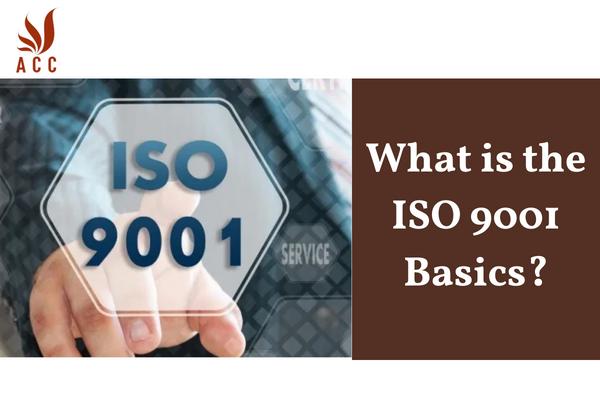In today's competitive business world, it is more important than ever for organizations to focus on quality. ISO 9001 is an international standard that provides a framework for organizations to implement a quality management system (QMS). A QMS is a systematic approach to managing an organization's processes to ensure that they meet customer requirements and continually improve.

What is the ISO 9001 Basics?
1. What is a QMS?
A QMS is a systematic approach to managing quality. It is based on the following principles:
- Customer focus
- Leadership
- Engagement of people
- Process approach
- Improvement
- Evidence-based decision making
- Relationship management
2. What are the benefits of ISO 9001 certification?
The benefits of ISO 9001 certification can be divided into two categories:
- Internal benefits: These benefits are realized by the organization itself, such as improved quality, efficiency, and reputation.
- External benefits: These benefits are realized by customers, suppliers, and other stakeholders, such as increased customer satisfaction and reduced costs.
3. Who is ISO 9001 for?
ISO 9001 is for any organization that wants to improve its quality management. It can be applied to organizations of all sizes, in all industries.
4. How to get ISO 9001 certified?
The process of getting ISO 9001 certified can be divided into the following steps:
-
Planning: The organization must first develop a plan for implementing ISO 9001. This plan should include the following:
- A gap analysis to identify the differences between the organization's current QMS and the requirements of ISO 9001
- A training plan for employees
- A communication plan for stakeholders
-
Implementation: The organization must then implement the QMS according to the plan. This includes developing and documenting policies, procedures, and processes.
-
Internal audit: Once the QMS is in place, the organization must conduct an internal audit to verify that it meets the requirements of ISO 9001.
-
Third-party audit: The organization must then undergo an audit by a third-party certification body. If the audit is successful, the organization will be certified to ISO 9001.
ISO 9001 is a valuable tool for organizations that want to improve their quality management. It can help organizations to meet customer requirements, reduce costs, and improve efficiency.
5. Frequently asked questions
Q1: What is ISO 9001?
ISO 9001 is an international standard for quality management systems. It provides a framework for organizations to establish, implement, maintain, and continually improve their quality management processes.
Q2: What are the key principles of ISO 9001?
The key principles of ISO 9001 include a customer-focused approach, leadership involvement, engagement of people, a process approach, evidence-based decision making, relationship management, and continual improvement.
Q3: Why is ISO 9001 important for businesses?
ISO 9001 helps businesses enhance customer satisfaction, improve operational efficiency, demonstrate commitment to quality, comply with regulations, and achieve a competitive edge. It provides a systematic approach to managing processes, ensuring consistency and continual improvement.
Q4: How does ISO 9001 certification process work?
The certification process involves several stages, including developing a quality management system, conducting an internal audit, seeking certification from an accredited certification body, undergoing an external audit, and, if successful, receiving ISO 9001 certification.
Q5: What are the main components of a quality management system under ISO 9001?
The main components include a quality policy, quality objectives, a process approach to management, documentation of the quality management system, monitoring and measurement of processes, and continual improvement.
Q6: How often is ISO 9001 certification renewed, and why is it necessary?
ISO 9001 certification is typically valid for three years. Renewal involves regular surveillance audits to ensure ongoing compliance with the standard. It is necessary to demonstrate a commitment to continual improvement and adherence to the established quality management processes.
Nội dung bài viết:






Bình luận